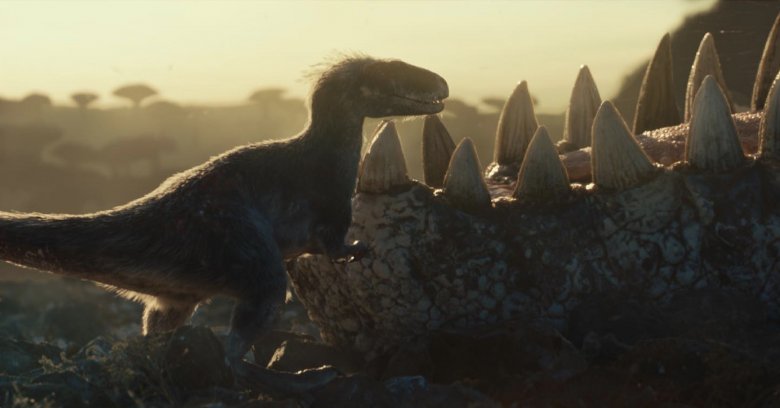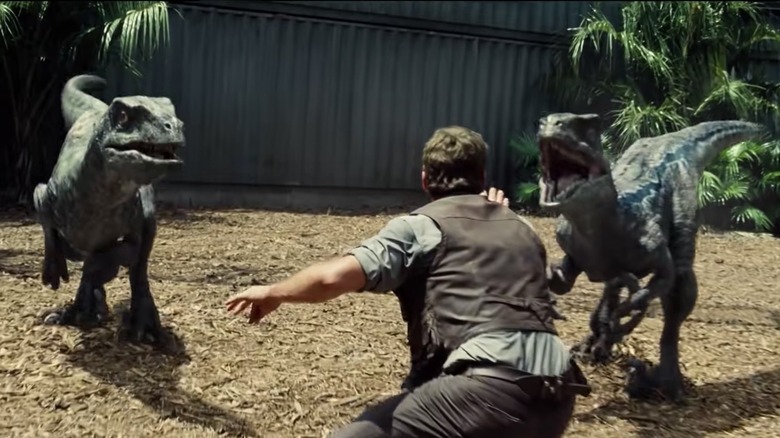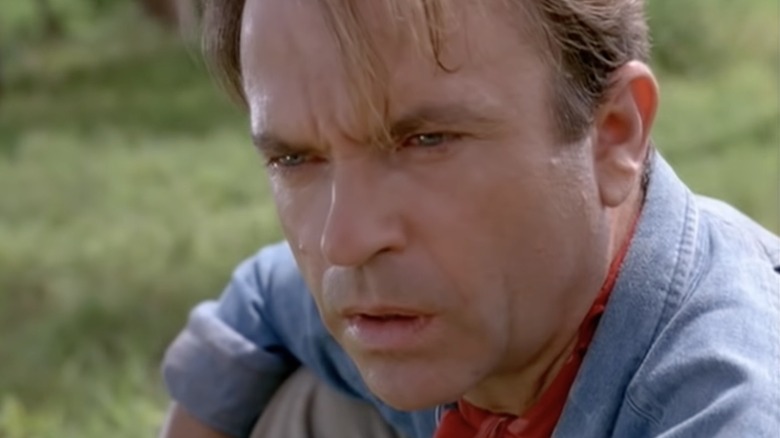New Jurassic World: Dominion Image Confirms What We Suspected All Along
"Jurassic World: Dominion" is slated for a June 10, 2022 release date, but a year ahead of its launch (and months after filming was known to be completed), the sixth movie in the "Jurassic Park" franchise is already starting its promotional campaign. On June 9, 2021, this included the announcement that an extended preview for the film will debut at "F9" IMAX showings starting on June 25 (via Deadline). It also included actor Sam Neill's release of a poster image (via Twitter) that showed not a dinosaur, but a mosquito — the tiny insect whose predatory instincts allowed dinosaur DNA to be collected for the purposes of returning dinosaurs to the present day.
And now, there's been another revelatory release. Director Colin Trevorrow took to Twitter to release the new image, which shows something exciting for "Jurassic Park" fans: a dinosaur with feathers.
In case there was any doubt, Trevorrow captioned the image to confirm that those furry-looking things you see on the baby dino's back and head do indeed indicate a more realistic appearance for the prehistoric creatures from the franchise. "Feathers," he wrote plainly. Fortunately, that's exactly what fans have been hoping for — and suspecting would happen at some point in the franchise.
Could this signal more realism is coming to Jurassic World: Dominion?
Although a few Twitter users question the science that has shown for years that dinosaurs (specifically, those in the Coelurosauria clade) are more closely related to modern-day birds than to predatory dinosaurs, this is something researchers have known for decades, per Scientific American. According to All About Birds, in 1964, paleontologists discovered a fossilized Deinonychus, leading John Ostrum to theorize that dinosaurs were warm-blooded. Later, in 1979, John McLaughlin released a book suggesting dinosaurs were feathered and warm-blooded. Since the 1990s — around the time the first "Jurassic Park" debuted in 1993, and after the book the film was based on was published in 1990 — scientists found more evidence in the form of fossils with feather-like structures (via the Encyclopaedia Britannica).
But the science in the "Jurassic Park" movies hasn't kept up with actual discoveries in paleontology, so representation on the big screen is definitely behind the times. This means, of course, that the public doesn't necessarily know that, for example, the traditional view of T. Rex as a fearsome hunter has, since a 1994 article by Jack Horner, been questioned. Thus, the depiction of more realistic dinosaurs has some people excited about what's in store.
"Seriously thank you," said Twitter user @re_rank, who pointed out that popular movies can play a "huge role" in changing the public perception of these creatures. They added, "While it may seem small, this small inclusion of full bodied feathers will inevitably help more people have a more accurate understanding of dinosaurs." Elsewhere, user @RevDolph tweeted, "Having feathers finally appear in THE dinosaur franchise will open up the possibility for more scientifically accurate depictions throughout the rest of pop culture. This is genuinely a really great thing."
The Jurassic Park franchise consults scientists, but they don't always get their way
The "Jurassic Park" movies have always tried to create a happy medium between scientific accuracy and the type of thrilling action-adventure that keeps people at the edge of their seats. The aforementioned Jack Horner, a paleontologist at the Museum of the Rockies, for example, acted as a scientific advisor on the first four films and helped inspire Sam Neill's character of Dr. Alan Grant (via Smithsonian Magazine).
"There were a lot of things wrong, but it was a fictional movie. It's not a documentary," Horner told Smithsonian Magazine about the accuracy of the original "Jurassic Park" movie. "And so I was just as happy with having some fiction thrown in there as anyone else was. I wanted it to be a good movie, and so there were times that Steven [Spielberg] and I would argue about things, but he was right. Basically, if I could demonstrate that something was true or not true, then he would go with that, but if I had some question about it and we didn't really have much evidence about it, he would go with whatever he thought would make the best movie."
For "Jurassic World: Dominion," the film's scientific advisor is Steve Brusatte, a paleontologist and dinosaur evolution and anatomy expert from University of Edinburgh (via Twitter). Brusatte actually responded to the comments on the Twitter thread spawned by Trevorrow's post, saying, "[This was] all Colin's vision, but I did my best to make the dinosaurs toe that line between accuracy and blockbuster film star."
We're guessing that once again, the next "Jurassic World" film will take a few liberties with dinosaur anatomy and behavior, but it's all in the name of making a good movie.



